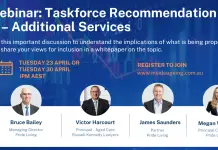From January to March 2020, the Aged Care Quality and Safety Commission conducted 147 residential aged care site audits. After personal and clinical care, the second most frequent requirement of the standards not met was 8 (c): Effective Governance Systems.
It was a similar story in the October to December 2019 quarter. Across the 173 residential aged care site audits conducted Standard 8, Requirement (3)(c): Effective Governance Systems was the third most frequently failed requirement.
Home services also performed poorly with Effective Governance Systems the second highest unmet requirement in the October to December 2019 quarter and the highest in the January to March 2020 quarter.
Standard 8, Requirement (3)(c) specifically relates to the governance systems supporting information management, continuous improvement, financial and workforce governance, regulatory compliance and feedback and complaints.
It focuses on how the organisation applies and controls authority below the level of the governing body – the Board in most cases. Simply – if the Board approves governance practices how does the CEO, executive and broader management ensure this is understood and acted upon at all levels of the business.
Agreeing on a governance framework to support your business is the obvious place to start. Such a framework must deliver governance systems and processes appropriate to the size and structure of your organisation. However, ensuring these are consistently applied across all business functions and roles is often where organisations come unstuck.
While a documented and agreed governance framework sets the structure for the organisation, the organisation must also have the systems to monitor and evaluate performance across the business.
A key area for organisation-wide governance systems to address is information management. One area information management focuses on is giving the appropriate levels of data access to the workforce, so they can perform effectively in their roles.
Information management should also consider consumers. How consumers can access relevant and accurate information about the care and services they receive and, in a timely manner.
The organisation-wide systems you establish must consider how the data received is maintained, stored, shared and destroyed. You need to ensure your organisation has the appropriate controls to maintain the privacy and confidentiality of all information.
While training and education play a major part in assuring adherence to your information governance framework, having a clear policy with supporting processes and procedures is vital. These provide very clear points of reference for all employees – ensuring they understand the requirements of their role in relation to information governance.
For more technologically sophisticated organisations, information governance strategy can be digitised. Digitising ensures: permissions to ensure data access or disposal is limited to specific roles; complaints and feedback are tracked and reported appropriately; prompting for clinical documentation to support care plans; timely reporting and dashboarding of clinical indicators; and financial management and reporting systems to assure prudential compliance.
These and more can be established as part of your IT systems and structure to support information governance.
Digitising your information governance strategy reduces the reliance on individuals remembering to complete functions to ensure your organisation’s adherence to your policy and processes. It can also provide management with timely reporting to enable a quick response to issues as they occur.
Most importantly these systems and processes assist you in better understanding what’s happening in your business — the risks for your organisation, identifying new trends and consumer needs and even assisting with continuous improvement priorities.
Delivering these outcomes is a long-term initiative. Once you have a documented information governance strategy and understand the proposed future state for your business, a prioritised digital transformation plan addressing resource limitations and key deliverables will ensure you are well positioned to meet Standard 8.
Ash Priest is the Managing Partner of Novigi. Novigi is an advisory and technology services firm. Data, integration and automation are core to the solutions Novigi provide clients.










